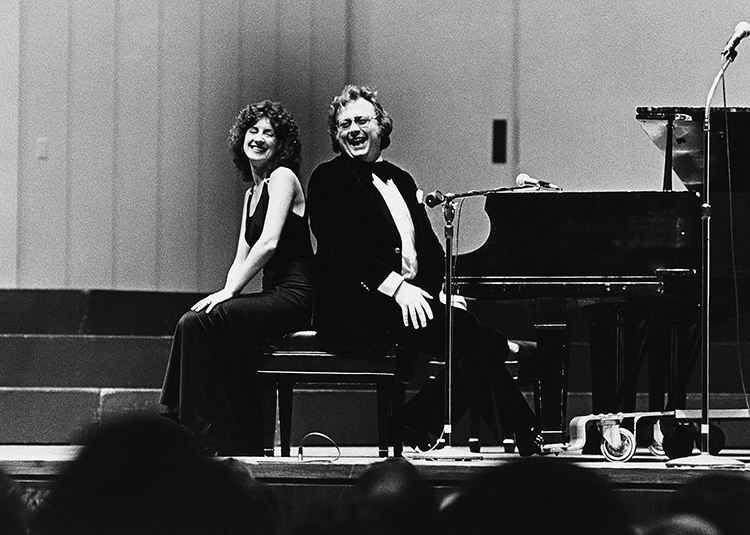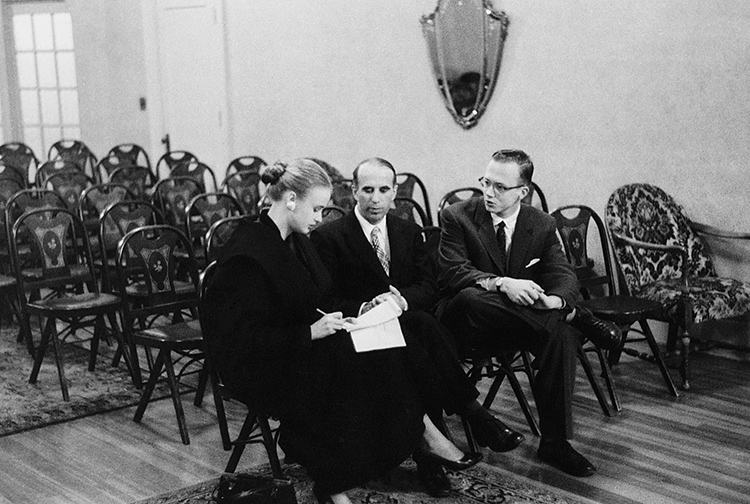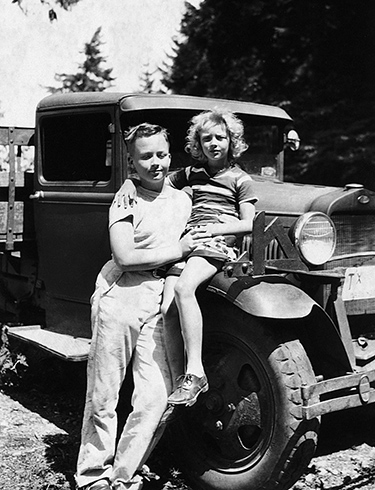Robert and Virginia Bolcom weren’t sure what to do with their son William. Here he was, 4 years old, not yet old enough for kindergarten, yet he played the piano like a maestro. And he composed, too — a Mozart in the making.
Young William grew up in a cocoon of music. His grandfather was a flamboyant Seattle lumber baron who thought nothing of smoking 20 cigars and downing two quarts of Scotch a day. He built an entire wing on his mansion overlooking Golden Gardens Park to accommodate famous musicians (such as renowned pianist Ignace Paderewski) who visited Seattle to play with the symphony.
Bolcom’s mother, an elementary school teacher, played classical music records to him when he was still in utero. His father, an industrial light bulb salesman, grew up rubbing elbows with music’s elite who dropped by his home all the time. Although no one in the Bolcom household was an accomplished musician (his mom did play a mean “I Love You Truly” on the piano, however), William Bolcom grew up with music in his veins and talent many compared to the masters.
But what do you do with a prodigy? The Bolcoms didn’t know, so they telephoned the University of Washington School of Music, looking for some advice. (Enroll him for private piano lessons at the UW when he turns 11, they were told.)
Bolcom’s parents were sure about one thing, however. They paid no attention to those who told them their kid could be a star if only they’d push him out on stage. “I am so thankful my parents put their foot down,” Bolcom says today. “Most child prodigies never really survive after that. They are all miserable because they have been exploited.”

Bolcom puts his heart into his work in this photo from 1955, when he was a UW student. Photo courtesy John Pollock.
Growing up in Western Washington, Bolcom faced enough challenges as it was. His dad, who was being groomed to take over the Bolcom Canal Lumber Co., just wasn’t suited for the grind. He ran a saw mill in Snoqualmie before it went bust, and had to move the family up and down the Puget Sound area looking for work. Living in rough-and-tumble timber towns like Snoqualmie and Everett wasn’t the best environment for a clumsy boy who preferred to spend his time playing music instead of sports. “People called me a sissy,” Bolcom recalls. “But I learned how to stay out of fights. I was glad when I was old enough for college and I didn’t have to put up with that any more.”
When Bolcom was 11, he started a routine that would last him for the next seven years. He’d board a Greyhound bus in Everett (where his family lived then) and ride to the UW by himself, where he would take private piano lessons with the late John Verrall, a longtime UW music professor. He did that until he turned 18, when he enrolled as a full-time student at the UW and earned his bachelor’s degree in music in 1958 — in just three years.
By then, everyone recognized the genius that resided in the affable youngster. After graduating from the UW, Bolcom studied with the legendary Darius Milhaud in California and Paris. Earning a master’s degree from Mills College and a doctor of music degree from Stanford, he honed his rare ability to compose everything from opera to American Ragtime-and do it better than anyone.
Over the past four decades, he has forged a distinguished international career with a musical voice that expresses a broad array of forms and a remarkable melding of traditional classical compositional styles with more populist idioms in American music, from ragtime to cabaret to Rodgers and Hart. His remarkable eclecticism has earned him world renown.
His works are performed throughout the world by world-class orchestras, opera houses, chamber musicians and soloists. Bolcom himself has recorded more than 40 albums as a piano soloist, accompanist and chamber music performer. His recordings helped revive ragtime, and his George Gershwin LP was the Record of the Year in 1973. He won the Pulitzer Prize in music in 1988 for his “Twelve New Etudes for Piano” and his compositions have been recorded by many illustrious artists and first-rate orchestras. Today, he is considered one of America’s greatest living composer.
For his stunning career, the University of Washington and the UW Alumni Association have bestowed upon Bolcom their highest honor: the 2003 Alumnus Summa Laude Dignatus Award. He joins a distinguished list of alumni who have been honored as the alumnus of the year. Started in 1938, the award is the most prestigious honor the UW bestows upon its graduates.

Bolcom and his wife mezzo-soprano Joan Morris, perform at the National Press Club in Washington, D.C., on Oct. 7, 1976. Photo courtesy William Bolcom.
“He was very precocious,” says Ken Benshoof, a classmate of Bolcom’s at the UW in the late 1950s who later taught at the UW School of Music for more than three decades. “He just had a natural facility for music. He had all the facilities that the rest of us were working hard to get.” What also made him great, Benshoof says, is that Bolcom “is totally unbounded by the conventions of his generation. He wasn’t trapped at all.”
“Bill is a genius, no doubt about it,” says Milton Katims, the former conductor of the Seattle Symphony who gave Bolcom his big break by commissioning him in the 1960s at a workshop in La Jolla, Calif. “He can move into different areas of music. Whatever he is doing, he does it so brilliantly you don’t know which is his best foot forward.”
If you mix popular and classical forms, it brings life to both genres,” says Bolcom, who can sit down at the piano and play anything in perfect pitch from the get-go. “By making them touch, something fresh, new and organic grows. I like the traditional and the newest culture coexisting in the same piece. The classical masters had that possibility — Haydn is full of pop tunes — and I want it, too.”
Voted most likely to succeed as a senior in high school, Bolcom — who refined his talent at home when his grandmother bought him a small Baldwin piano from the Sherman Clay Music Store in downtown Seattle — has been one half of one of the more fruitful and long-lasting collaborations in American classical music. Since the 1960s, he has worked with librettist Arnold Weinstein to produce some of the most interesting and unique works in American music, including the operas Dynamite Tonight (1966), McTeague (1992), A View from the Bridge (1999) and The Wedding, which will have its premiere in 2004 at Lyric Opera of Chicago.
“Bolcom’s music is a wordless rebuttal to ideas of rank and category,” says New York Times music critic Bernard Holland. “He works hard to erase the lines between the elite and the vulgar, the intellectual and the visceral, the select and the popular. Music, he seems to be telling us, has pulled itself apart from both ends of the cultural spectrum: the classical extremity eager to isolate high-mindedness and rise above the everyday; the pop end cornered by a concern for the bottom line.”
Despite his evident talent as a youngster, not everyone quite knew what to make of Bolcom. “He was a brilliant young man,” recalls David Lamb, who was a grad student in music at the time Bolcom was an undergrad. “But we once had a squabble. He begged me to criticize a piece he composed, and I did. He had just done a first draft and didn’t think it needed any revisions. I told him it did, and he wouldn’t speak to me for a while.” The hard feelings didn’t last long — Bolcom sold his bike to Lamb for $25 in 1957, and Lamb rides it to this very day.
The self-effacing Bolcom came back to the UW to teach for a year in the 1960s, but felt out of sorts. “He would walk into the faculty mailroom and be among the professors he studied with, and he felt he didn’t belong,” retired UW music professor James Beales recalls. Little did he know.

UW student William Bolcom (right) meets with his piano teacher, longtime UW music professor John Verrall (center) and an unidentified woman in this UW room in 1957. Photo courtesy William Bolcom.
In the 1960s, Bolcom got his big break when Katims, then the director of the La Jolla Musical Arts Society, presented a series of summer concerts with a chamber orchestra. Each program included the premiere of a work by an American composer commissioned with the financial help of the association’s men’s committee. He had already conducted new works by William Bergsma, David del Tredeci, Benjamin Lees and others when he was told about a young Seattle phenomenon named William Bolcom. Katims called.
The result, the first of many collaborative efforts between the composer and conductor, was called “Fives.” It so impressed Katims that he later arranged to have the Seattle Symphony play it.
“It has been my experience,” says Katims, now in his 90s, “that composers generally fall into two categories — those who are flexible and are quite willing to listen to suggested changes and those whose reaction is, ‘No, I want it the way I wrote it!’ Bill Bolcom belongs to the first group, always eagerly listening to different ideas and then deciding whether his muse accepts the change. That may have a lot to do with the tremendous success he has enjoyed.”
Bolcom himself isn’t quite sure where it all comes from. “I don’t know how I compose — I just do it,” he said in a 1997 interview. “I can’t help doing it. If I ever stopped feeling that way, of course it would be a great relief to stop. Composing is very labor-intensive and the reward is getting a piece played, I guess. I mean, it doesn’t make any money, it doesn’t necessarily get you girls. We all seem to have rather nice wives, but I think the reason they stay with us is they know where we are most of the time. You know, we’re available for taking out the garbage.”

William Bolcom with his younger sister Robin, July 1950. Photo courtesy John Pollock.
One area where Bolcom gets much of his inspiration is literature. While at the UW, he was a student of Theodore Roethke, the Pulitzer Prize winning poet. “I learned how to write poetry and see how it was made,” he says. Bolcom has gone on to compose many works from plays, including his most recent venture, A View From the Bridge based on the great Arthur Miller work, that the Metropolitan Opera performed in New York in December. “The song ‘New York Lights’ is performed with a melting tenderness. The song offers the audience a sudden pungent taste of a melody so enticing it could turn into a pop standard. When was the last time an American opera produced such a tune? Porgy and Bess?” wrote New York Times critic Stephen Holden.
Bolcom used his considerable talent to put himself through school, earning money by playing gigs at fraternity dances, stag parties and Saturday night burlesque shows — followed by Sunday morning church recitals. And that was in addition to a job he had as night operator at the Meany Hotel.
Not the most graceful person, Bolcom often showed up late to class after working at the Meany. He would tiptoe into class but negate his good intentions by doing something clumsy like dropping a book on the floor. “I was never very athletic or coordinated,” he says. “If there is a table in the room, you can be sure my shin will find it.”
He also has found success at every turn as well. In addition to his prolific composing, he and his third wife, Joan Morris, a renowned mezzo-soprano, perform as many as 50 concerts a year, dazzling audiences and critics alike with a repertory of American popular songs, from vaudeville numbers of Lillian Russell’s era to the show tunes of Broadway’s heyday. “She sings them straight, her mezzo-soprano aglow with wonderment at the simple dramatic beauty of a Kern or a Gershwin phrase. He provides an elegant partnership at the keyboards that transcends the rather denigrating recital-hall term ‘accompanist,’ “ crowed Newsweek magazine. “Don’t worry about whether this is classical or popular, they seem to be telling us. ‘Just listen; isn’t it wonderful?’ Yes, it is.”
Bolcom, who has been a professor of music at the University of Michigan for the past 30 years, returned to the UW in 1994 for a two-week residency as the Hans and Thelma Lehmann Distinguished Professor. In addition to working closely with UW music students, he put on a concert, “William Bolcom: A Music Homecoming,” that won rave reviews. “Bolcom is rare among today’s performers, with successes in fields as intimate as the cabaret song and as mammoth as grand opera,” wrote the Seattle Times’ Melinda Bargreen.
“Music is not just about sound,” explains Robin McCabe, ‘71, director of the UW School of Music who still relishes the memory of a private impromptu session in which she sat down at the piano with Bolcom and his wife to play several tunes from Follies and Company. “It’s about form, shape, gesture, tension, release. And Bill is able to talk about what he does. Many composers are not articulate about it.”
Or, as Virginia Katims, the wife of the former Seattle symphony director and a world-famous violist herself says, “Bill’s music is from the heart, mind and soul.”
Bolcom surprised many observers by his success in American music — ragtime, mostly. He came upon this direction while a UW student, while in the throes of wondering what to do with himself as far as music was concerned. “One reason I’m involved with American popular song is that it exists close to the real choices that make us who we are,” he explained in an earlier interview. “I always reject the American composer with the flag in his piece. That’s not my way, but I do realize one has to be what one is. In order to be universal, you have to be particular. Maybe there’s a little nationalism in that.”
Bolcom, who calls himself an “omnivore” who fed on the Beatles, Gershwin, Kern and Berlin, is credited with reviving ragtime in the 1970s with nonchalantly elegant recordings of rags by Joplin, Lamb, Scott and himself. But he has never liked being called eclectic. “I am not a synthesizer,” he says. “I’m interested in showing how different elements relate. My music tries to make the relationships clear. The more I look to the future, the more I keep coming back to the past. They come together. Maybe if we can find these axes between old and new, serious and popular, we can keep music afloat.”
Today, at age 64, Bolcom keeps on full speed ahead, in spite of recent surgery on an arthritic right hand. His routine is the same as it’s been for years — he’s up at 6 a.m., has espresso and toast with jam and a glass of juice, and while in his skivvies that he wears around the house, puts in four hours of work on a score. He has been known to work all day and all night. “I’m such a workaholic. It’s not healthy, but my head is working in the middle of the night and I can’t ignore that,” he says. “Ideas hit you. They just come. Then comes all the practical stuff, like craft and the hard work.”
What’s next? Who knows? But you can be sure it will be dazzling. Everything he has done — from opera, to piano quartets to the terrific cabaret song “Lime Jello,” inspired by a dish served to some fellow diners at a Portland home style restaurant — is sure to enrapture and tickle his listeners. After all, music is in his veins.